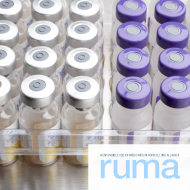Farm antibiotics task force refreshed

RUMA's attention is turning to the aims of UK farmers and their vets beyond 2020.
A task force set up by the Responsible Use of Medicines in Agriculture (RUMA) Alliance in 2016 to identify targets for antibiotic use in UK farm livestock has been refreshed, and convened in a meeting to start defining new goals post-2020.
With each sector now on track to meet most of the targets set by the original Targets Task Force in time for the 2020 deadline, attention is turning to the aims for UK farmers and their veterinary surgeons beyond that point.
Chris Lloyd, secretary general of RUMA, says that many of the “easier battles” on reducing antibiotic use have now been won, making the next phase of target-setting more complex, but just as important. “With some sectors now at – or fast approaching – lowest potential use without risking animal health and welfare or food safety, I think we will see far more focus on ways to demonstrate the quality of management, and the health and welfare of the animal.”
Mr Lloyd adds that the new iteration of the Targets Task Force has 10 livestock groups rather than the eight in the last initiative. “Calves have been introduced as a particular area of interest because of the way they span the dairy and beef sectors; and the fish sector has been split into salmon and trout species.”
The first meeting took place on 10 September, and the group is due to meet next in February 2020 to gauge progress. As before, the British Veterinary Association, Food Standards Agency, National Office for Animal Health, Red Tractor and Veterinary Medicines Directorate will be observers, with levy board AHDB also joining this time. The new post-2020 targets will be agreed and reported before the end of next year.
The British Veterinary Association (BVA) has welcomed the establishment of the refreshed task force.
James Russell, BVA junior vice-president and representative on the new RUMA Targets Task Force, said: “The original RUMA Targets Task Force and representatives of each of the eight livestock sectors have been hugely successful in reducing antibiotic usage, particularly the use of High Priority Critically Important Antibiotics (HP-CIA). We must maintain this momentum in the face of the ongoing global threat posed by antimicrobial resistance.”
Ongoing work by vets, farmers and industry has led to a 40 per cent reduction in sales of antibiotics meant for use in food-producing animals in the UK over the last five years, with sales of the HP-CIAs dropping by 52 per cent in this period.
In May this year, the BVA released an updated policy position on the responsible use of antimicrobials in food-producing animals amid an increasing global push for ‘One Health’ working to protect antimicrobials for the sake of animal and human health.
Apart from reiterating that vets should continue to be guided by the seven principles of responsible antimicrobial use, the position also recommends that the Government continues to work with vets and industry to review and set further rational targets through the RUMA Targets Task Force and to promote incentives to improve husbandry and biosecurity measures on farm.



 BSAVA is to partner with BVA Live (11-12 June 2026) to champion clinical research.
BSAVA is to partner with BVA Live (11-12 June 2026) to champion clinical research.